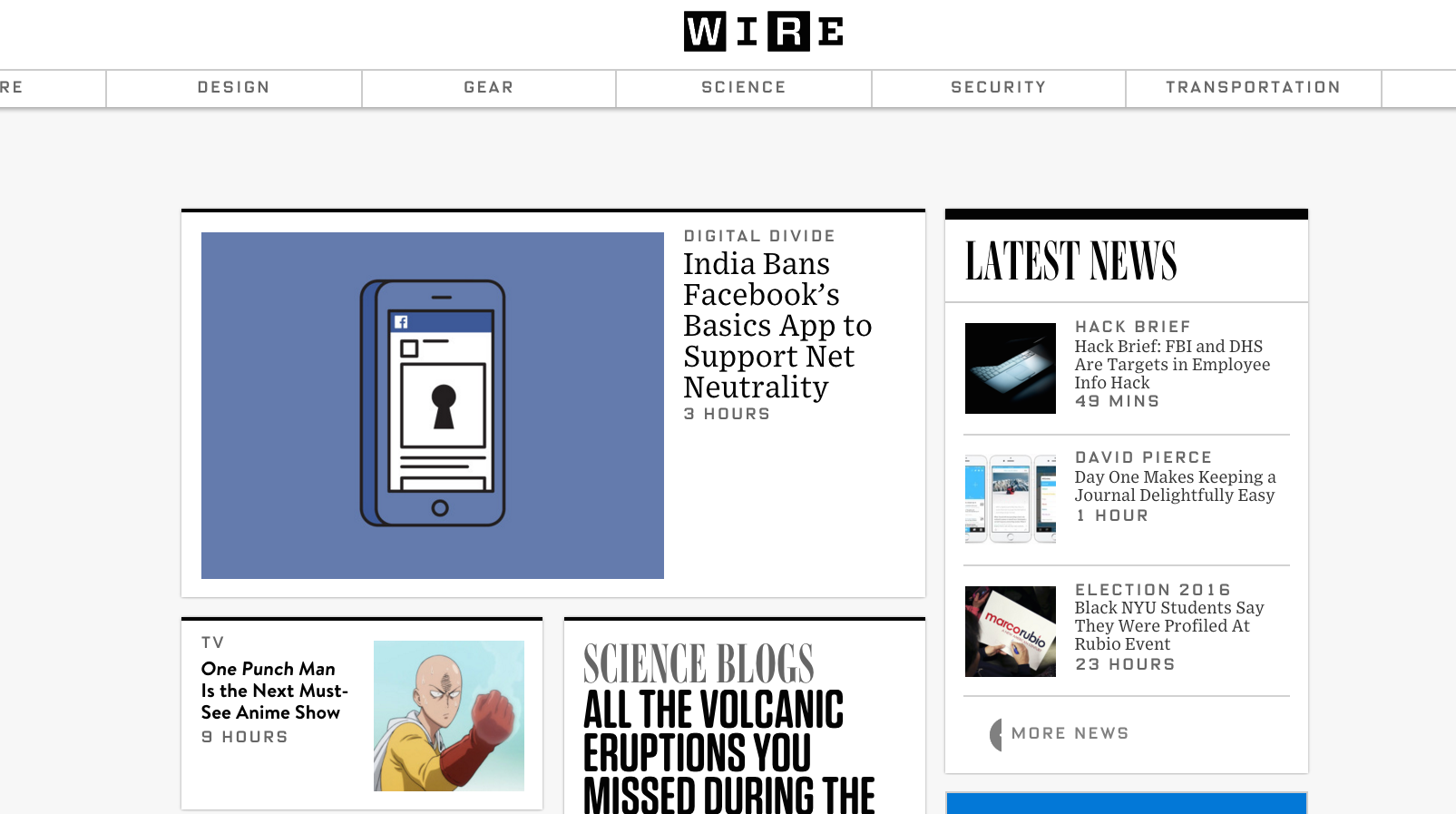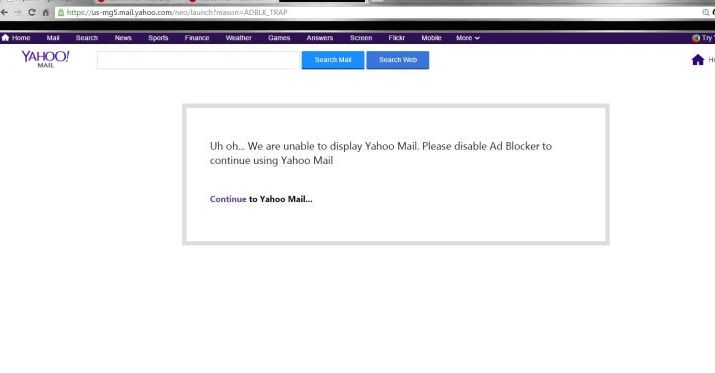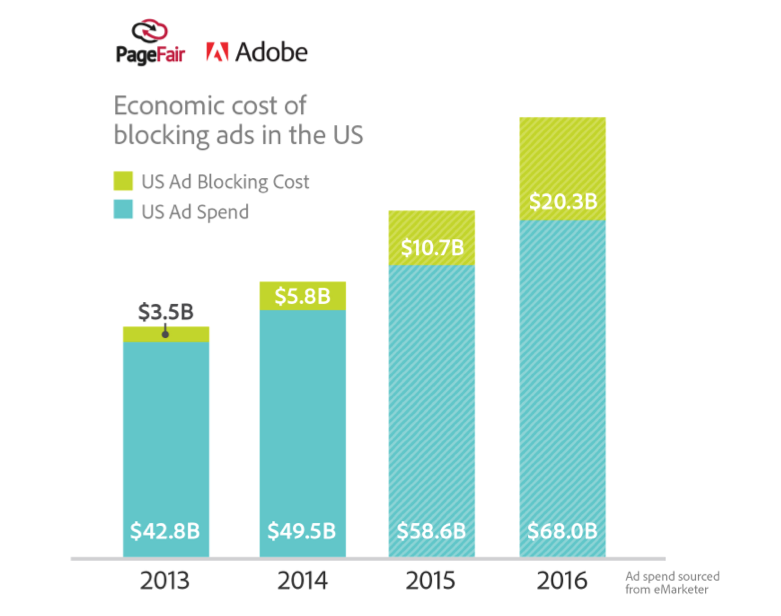You know that feeling of relief and serenity that comes with a web-browsing experience free of annoying popups, auto-play video ads, and screen-dominating interstitials? As predicted, Google is planning to launch a new ad blocker on Chrome next year in an effort to clean up the internet. [More]
ad blockers

Google Reportedly Planning To Build Ad-Blocker Into Chrome
Unless you work in the advertising industry, chances are you hate online ads that slow down, interrupt, or just plain ruin your browsing experience. That’s why the use of ad-blocking technology has soared in recent years. But would Google, which makes a mountain of money off web ads, actually build an ad-blocker directly into its Chrome browser? [More]

Why Is Google Blocking This Ad-Blocker On Chrome?
Ad-blockers might have started out as kind of a weird niche thing for techies and privacy advocates, but they’re now commonplace. Every major browser app lets you run plug-ins or extensions that can banish unsightly, privacy-compromising ads from your sight, and these browsers generally stay out of the escalating war between ad-blocking users and ad-blocker-blocking sites. Yet, the makers of one ad-blocker say Google has thrown their app out of the Chrome store, and disabled the service’s function in Chrome for all users. So what gives? [More]

Companies Surprised To Hear That Adblock Plus Is Running An Ad Network With Them
Yesterday’s announcement that the company behind popular ad-blocking browser extension Adblock Plus started its own ad network wasn’t all that surprising in hindsight: the company had been selling the right to show some users unobtrusive ads to publishers for five years. The news did take two companies that Adblock Plus claimed would be its partners in the ad exchange by surprise: ad companies AppNexus and Google. [More]

AdBlock Plus Goes Into The Business Of Selling Ads: Wait, What?
AdBlock Plus, the popular browser extension that does exactly what it sounds like, has actually been in the ad business for a long time, letting unobtrusive “acceptable” ads through, taking a percentage of the proceeds. Some publishers characterize this as a shakedown, but the company behind AdBlock Plus says that it’s simply trying to make ads more pleasant and less disruptive for everyone. Now the company is going into the business of selling ads. [More]

Facebook Thinks You Love Ads So Much, It’ll Helpfully Block Your Ad-Blocker For You
Facebook — one of the world’s largest advertising companies — magnanimously acknowledges that in your life on the internet, you’ve probably encountered some bad ads. And you almost certainly have, because online advertising can be obtrusive, creepy, and irritating to say the least. But Facebook thinks that they are so far ahead of the pack that you will actually want to see their ads, and so they’re going to circumvent your ad-blocker for your own good. [More]

Americans Apparently Don’t Hate Mobile Ads As Badly As Rest Of The World
If you’re using ad-blocking technology on your smartphone, you’re not alone. Some 2.5 million Americans are employing mobile browsers and other tech on their devices to avoid unwanted ads, but that’s nothing compared to the vast number of consumers blocking ads in China, India, and Indonesia. [More]

European Wireless Carriers Want To Block Customers From Seeing Ads On Smartphones
A growing number of people are choosing to use ad-blocking technology to prevent ads from loading on their smartphones, resulting in billions of dollars of unearned ad revenue by publishers. But what if the choice to block ads wasn’t yours, but was a network-wide ban on ads from your wireless carrier? [More]

Want Wired.com Without Ads? That’ll Be $3.99/Month
With billions and billions of ad dollars going unearned by websites each year because of the increase use of ad-blocking technology, it’s no wonder that some publishers are fighting back. Last year, magazine giant Conde Nast started erecting virtual walls to prevent ad-block users from visiting some of its sites, and now the company is going to try to give these anti-ad readers the option of a monthly access model for Wired.com. [More]

1/3 Of American Adults Use Online Ad-Blockers, Few Publishers Try To Stop Them
If you’re one of the approximately 1/3 of American Internet users who employ an ad-blocker in your web browser, we don’t mind, because Consumerist doesn’t accept advertising. Other websites that do depend on ads for their income definitely do mind that customers are using ad-blockers, but they don’t really do anything to stop users. Why is that? [More]

GQ Website Gives Ultimatum To Readers: Disable Ad-Blockers Or Pay Up
With ad-blocking apps and plugins preventing U.S. content companies from earning some $22 billion a year off your eyeballs, some sites are throwing down the gauntlet and demanding that readers pay up if they want to avoid ads. [More]

Use AdBlock And Yahoo May Block You From Reading Your E-Mail
If you still live in 2003 and have a Yahoo e-mail account but also use Ad Block to, ya know, block ads, then the folks at Yahoo might have a nasty surprise for you when you go to check your inbox. [More]

AdBlock Plus Will Use An Independent Board To Choose Ads To Unblock
One way that ad-blocking programs make money is, paradoxically, by showing you some ads. The popular add-on AdBlock Plus shows users ads that it deems “acceptable” by default, and has been accused of charging some publishers a percentage of the ad income that otherwise would have been lost. Now the maker of AdBlock Plus, Eyeo, is changing how it decides which ads deserve unblocking. [More]

Popular iOS Ad-Blockers Charge Advertisers For Access To Your Eyeballs
Now that ad-blockers are available for Apple’s iOS phone and tablet platform, the ad industry is nervous. Yet not as nervous as it could be: adding ad-blockers to iDevices is just an extension of how ad-blocking works on your desktop. Depending on which extension or app you use, advertisers may be paying the developer for access to your screen. [More]

With Ad-Blockers Coming To iPhone, Ad Industry Poised For A Fight
According to one estimate, some $22 billion in online ad revenue was lost last year because so many people use ad-blocking plugins on their web browsers. And that number is set to soar with an upcoming tweak to Apple iOS that will allow ad-blocking on the iPhone and iPad’s Safari browser. The ad industry is looking at a number of ways to stem this tide, including the legal route. [More]

Ad Blockers Will Prevent You From Seeing $22B Worth Of Unwanted Ads This Year
Are you using an ad blocker on your web browser? If so, you probably don’t care what’s behind those grayed-out boxes where the ads are supposed to be. The folks who do care are the websites you visit, because they aren’t getting ad revenue from those grayed-out boxes. A new report says that ad-blocking will result in nearly $22 billion in lost ad revenue worldwide this year. [More]

AdBlock Plus Still Either Making Advertising Tolerable Or Shaking Down Publishers
Ad-blocking browser extensions can make Web-surfing tolerable when you find ads that are animated, pop up, or produce sound tedious. However, users’ ad-eschewing ways are bad for content providers that support themselves with sponsors. The extension AdBlock Plus tries to find a compromise between these competing interests, allowing the least offensive ads through. For a price. Now we’ve learned that big companies like Microsoft, Google, and Amazon are paying to have ads let through the system. [More]


